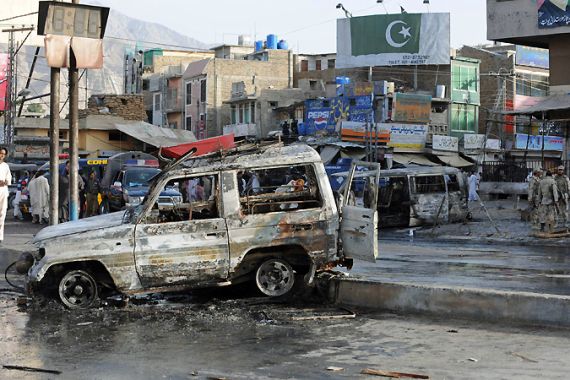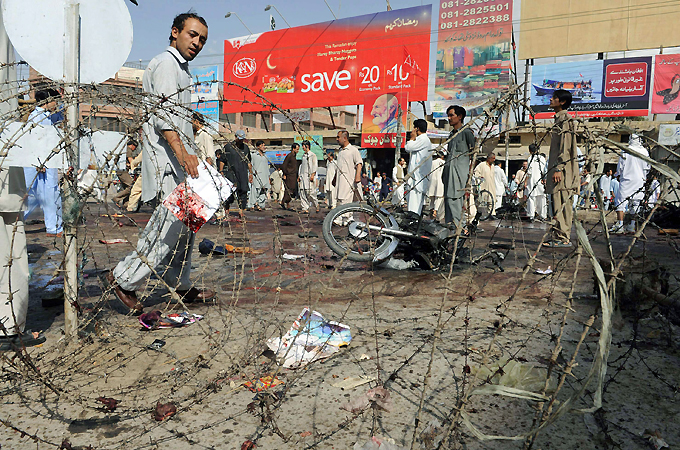Deadly bombing at Pakistan rally
More than 50 people killed in suicide bomb attack at large protest in southwestern border city of Quetta.

|
At least 54 people have been killed and nearly 200 injured in a suicide attack targeting a Shia Muslim rally in Pakistan’s southwest city of Quetta.
Police officers said the bomber was among the 450-strong crowd and had detonated the device on reaching the main square in the city on Friday.
Keep reading
list of 4 itemsTurtles swimming to extinction in Malaysia as male hatchlings feel heat
Could shipping containers be the answer to Ghana’s housing crisis?
Thousands protest against over-tourism in Spain’s Canary Islands
The explosion triggering chaotic scenes, with some people set on fire as others fled or lay on the ground to avoid ongoing gunfire.
The bomb appeared to target the rally being held for al-Quds day, an international event held every year by the Shia community in opposition to Israel’s control of Jerusalem and to show solidarity with Palestinian Muslims.
The Pakistani Taliban have claimed responsibility for the attack.
Qari Hussain Mehsud, the Pakistani Taliban commander, told The Associated Press news agency that though they are fighting the US and the Pakistani government, “Shias are also our target”.
Earlier, unconfirmed reports said that the attack was claimed by the Laskhar-e-Jhangvi (Army of Jangnvi), an armed group known for its attacks against Pakistan’s Shia community.
Shia minority
Shia Muslims are in the minority in Pakistan, accounting for around a fifth of the country’s 160 million population, which is dominated by Sunnis.
| IN DEPTH | |||||||||||||
|
“What we have seen unfortunately in the holy month of Ramadan, is that these so called Islamic groups, who profess to be the saviors of Islam, have continued their suicide bombings on innocent civilians and on our military forces and police forces,” Farahnaz Ispahani, a media adviser to the president of Pakistan, told Al Jazeera.
“And what we have seen recently is also an increase of attacks on the Shia minority in Pakistan,” she said.
Police were forced to quell unrest following the attack, said Sardar Khan, chief of Quetta’s police control room.
“An angry mob tried to set on fire a private building and vehicles. Some of the participants were armed and they were firing in the air,” Khan said.
“They also set on fire some bicycles and motorcycles.”
Local television channel AaJ said one of its drivers had been killed in the blast, while there were reports of several other journalists injured in the incident.
Yousuf Raza Gilani, Pakistan’s prime minister, strongly condemned the attack and called for an immediate inquiry into the incident. The US embassy also condemned the attack.
Ramadan violence
It was the latest in a string of attacks as Muslims marked the final days of the holy month of Ramadan.
Earlier, at least one man was killed and four wounded on Friday when a suicide bomber blew himself up after being apprehended by police outside a mosque of the Ahmadi sect in the city of Mardan in northwest Pakistan, police said.
“A suicide bomber was trying to enter the Ahmadis’ worship place, but he was intercepted by police,” Waqif Khan, the Mardan police chief, said, adding that the bomber had been shot before blowing himself up on the ground.
“A passerby was killed and four others were wounded in the firing and suicide attack,” Khan said.
He said it was unclear whether the man was killed by the bomb or by gunshots fired by the guards.
Police have handed over the bomber’s body parts to a forensic team, Khan said.
In the northwest city of Peshawar, which has often been targeted by armed groups, at least three policemen were injured when a bomb exploded near their patrol vehicle, police said.
The officers were checking vehicles on the city’s ring road and Mohammad Karim Khan, a senior police official, said the bomb was detonated by remote control.
On Wednesday, three suicide bombers killed 31 people and wounded hundreds when they targeted a Shia mourning procession made up of thousands of people, at the moment of the breaking of the fast in the holy month of Ramadan.
Religious violence in Pakistan, mostly between Sunni and Shia groups, has killed more than 4,000 people in the past decade.
Ahmadi’s attacked
In May, nearly 100 people were killed in the eastern city of Lahore after armed groups stormed two Ahmadi prayer halls, launching gun and grenade attacks.
Gunmen later raided the hospital where victims were being treated, killing four people in a shootout.
Founded by Ghulam Ahmad, who was born in 1838, the Ahmadi sect believes that Ahmad himself was a prophet and that Jesus died aged 120 in Srinagar, the summer capital of Indian-ruled Kashmir.
Pakistan declared them non-Muslims in 1974 and 10 years later barred them from calling themselves Muslims.
Many attribute the wave of violence in Pakistan over the past three years to Islamabad’s alliance with Washington and the US-led war against a resurgent Taliban in neighbouring Afghanistan.
They say the attacks are co-ordinated by Taliban and al-Qaeda-linked fighters living in the remote mountainous areas bordering Afghanistan.

